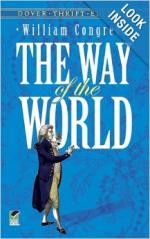
|
| Name: _________________________ | Period: ___________________ |
This test consists of 15 multiple choice questions and 5 short answer questions.
Multiple Choice Questions
1. What is the consequence of the revelation made by Mirabell concerning Mrs. Fainall?
(a) Lady Wishfort says she must give Mrs. Millamant to Mirabell.
(b) Fainall and Marwood become resigned to their failure.
(c) Mrs. Millamant refuses to marry Sir Wilfull.
(d) Sir Wilfull decides to marry Lady Wishfort.
2. Why does Lady Wishfort dismiss Foible?
(a) Foible was plotting with Mirabell.
(b) Waitwell went to jail.
(c) Lady Wishfort could not consummate her marriage to Sir Rowland.
(d) Mrs. Fainall had an affair with Mirabell.
3. What does Mrs. Fainall ask the maids to do for her at the end of Act 5, Scene 1?
(a) Help her defeat her husband.
(b) Vouch for her morals.
(c) Calm her mother.
(d) Catch her husband cheating on her.
4. Who delivered the epilogue?
(a) The same actress who played Mrs. Millamant.
(b) Congreve's wife.
(c) A special reader.
(d) Congreve himself.
5. To keep Mrs. Fainall's infidelity secret, Fainall demands all of the following concessions except one item? What is it?
(a) Mrs. Fainall's fortune.
(b) Lady Wishfort's estate after her death.
(c) A divorce from his wife.
(d) Mrs. Millamant's dowry.
6. In order for Mrs. Millamant to become Mirabell's prize, he must first ___________ .
(a) Keep Sir Wilfull from marrying Mrs. Millamant.
(b) Prevent Fainall from divorcing Mrs. Fainall.
(c) Stop Fainall from killing Mrs. Fainall.
(d) Defeat Fainall's machinations.
7. What has Lady Wishfort discovered that has her so angry at the beginning of Act 5, Scene 1?
(a) Fainall is going to ruin her.
(b) Sir Rowland was actually a foreigner.
(c) Her maid was stealing from her.
(d) Her suitor, Sir Rowland, was a fake.
8. What else does Sir Wilfull say when he apologizes for his drunken behavior?
(a) Says he is ready to marry Mrs. Millamant.
(b) Promises that he will never drink again.
(c) Claims he must continue with his travels.
(d) States that he is leaving on his travels.
9. What does Sir Rowland claim as he enters the dining room and greets Lady Wishfort?
(a) He wants to have a quiet wedding in the country.
(b) He claims that Mirabell will starve him to prevent their marriage.
(c) He will die of a broken heart if their marriage is delayed.
(d) He will be patient and wait for the wedding to occur.
10. What are the first poets going to do when judging a play?
(a) Insult the dramatist.
(b) Say it is unworthy of the playwright.
(c) Suggest the author is unable to produce another good work.
(d) Say they dislike it, because they always dislike the plays they see.
11. What does Foible tell Mrs. Millamant when she reaches her in Act 4, Scene 1?
(a) That her aunt is almost ready to receive Sir Wilfull.
(b) That Mirabell is waiting to see her.
(c) That she should begin to dress for dinner.
(d) That her Lady Wishfort wishes to see her.
12. When accused of adultery, what does Mrs. Fainall do?
(a) Demands Mrs. Marwood produce proof of her infidelity.
(b) Lies and denies everything.
(c) Slaps Mrs. Marwood.
(d) Begs her mother's forgiveness.
13. How does Foible disobey Lady Wishfort instructions when Lady Wishfort sends Foible to ensure Sir Wilfull and Mrs. Millamant talk?
(a) By speaking to Mrs. Fainall in the corridor.
(b) By going to Mrs. Millamant instead.
(c) By telling Sir Wilfull that Mrs. Marwood wants to speak with him.
(d) By locating Sir Wilfull, but offering him more drink.
14. Which character(s) is/are not present in Lady Wishfort's dining room?
(a) Mirabell and Fainall.
(b) Sir Wilfull and Witwoud.
(c) Lady Wishfort.
(d) Mrs. Millamant and Mrs. Fainall.
15. Why does Mrs. Millamant leave the room after the arrival of Witwoud and Petulant?
(a) She believes that Mirabell is coming.
(b) She becomes frustrated with Witwoud and Petulant.
(c) She needs to get dressed for dinner.
(d) She dislikes them.
Short Answer Questions
1. How do we know Lady Wishfort has not read the entire letter?
2. What does Mrs. Marwood's discussion with Fainall reveal about her character?
3. What is Lady Wishfort doing as Act 4, Scene 2 commences?
4. What social issues did the play focus on?
5. What inconvenience does Foible point out about Sir Rowland to Lady Wishfort?
|
This section contains 785 words (approx. 3 pages at 300 words per page) |

|




